The Anaheim Ducks are currently in the midst of a downwards trend, and over the course of their history have experienced plenty of ups and downs. In the NHL––and sports leagues worldwide––the head coach is seen as the figurehead of those ups and downs as he is lauded for his team’s successes and derided for their failures. Throughout the years, the Ducks have had coaches bring them to the pinnacle of success via the Stanley Cup, and to the depths of failure by being at the bottom of the standings. These are those coaches.
Ron Wilson (1993-97)
In 1993, The Walt Disney Company brought hockey to Anaheim via the Mighty Ducks, and their head coach faced a mighty challenge in having to bring life to an expansion team in a new hockey market. To do so, general manager Jack Ferreira brought in Vancouver Canucks assistant coach Ron Wilson.

Wilson started his career playing college hockey at Providence College. He went on to juggle time between the AHL, Swiss National League, and the NHL before retiring in 1988. After retirement he was hired as an assistant coach for the Milwaukee Admirals. He later joined the Canucks in the same role where he spent time with the legendary head coach and hockey executive Pat Quinn.
Wilson came to Anaheim highly recommended by Quinn as well as Lou Lamoriello and Brian Burke. His teams struggled initially, and they didn’t post a winning record until the 1996-97 season when Paul Kariya, Teemu Selanne and Steve Rucchin became a dominant forward line. In the 1997 Playoffs, Wilson’s Mighty Ducks took the Phoenix Coyotes to game 7 and won the series 4-3. The Ducks were swept out in the next round by the eventual Stanley Cup champion Detroit Red Wings.

Wilson was let go after the 1996-97 season with Ferreira citing “philosophical differences” as the reason for letting go of his head coach. Wilson often clashed with Mighty Ducks team president Tony Tavares, and it slowly became evident that the two of them were unable to work together. Wilson ended his career in Anaheim with a 120-145-31 regular-season record and a 4-7 playoff record. He went on to have successful coaching stints with the Washington Capitals, San Jose Sharks and Toronto Maple Leafs, as well as coaching the U.S. Olympic hockey team, earning them the silver medal in 2010.
Pierre Page (1997-98)
Expectations were high for the Mighty Ducks following the 1996-97 season. They made their way into the playoffs for the first time in their young existence and breakout stars Kariya and Selanne were in the prime of their careers. They fired Wilson and wanted to bring in someone who could take them to the next level. Enter Pierre Page.
Page and GM Ferreira were good friends and had known each other since working for the Calgary Flames in 1980, Page as an assistant coach and Ferreira as a scout. Ferreira had previously hired Page as head coach of the Minnesota North Stars where he coached for two seasons.
Page’s season with the Mighty Ducks started rough as Kariya sat out the first 32 games over a contract dispute, and later sat out the last 28 games of the season after suffering a concussion. Through the season the Mighty Ducks suffered injuries to Selanne, Rucchin, Travis Green and Scott Young.
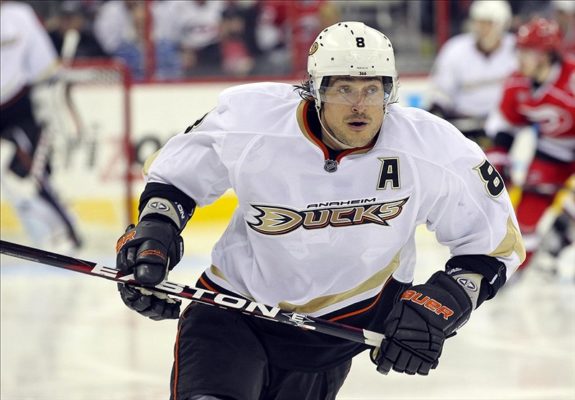
The Mighty Ducks ended the season with a 26-43-13 record, were sixth in their division, and only one point ahead of the seventh-place Canucks. After such a disappointing season, Ferreira was prepared to give Page another chance, however, Page wanted to take the team in a different direction. After a lot of thought, Ferreira decided to fire Page saying, “I thought we were together on [what direction to take the team], but we weren’t.”
Craig Hartsburg (1998-2000) & Guy Charron (2000-01)
In 1998, the Mighty Ducks had a tumultuous offseason when they brought in Pierre Gauthier to take over general manager duties for Ferreira. Gauthier was the Ottawa Senators’ GM and had left abruptly to spend time away from hockey and focus on his family. Seventeen days after leaving Ottawa, he was hired by Anaheim. Some suspected foul play by Anaheim, but Gautier insisted that he was “a free agent. I had a lot of opportunities around the league. It was an amicable separation,” (from ‘Rebuilding Project’ – The LA Times – 10/6/98).
Gauthier’s hiring occurred while management was trying to sign Butch Goring as head coach. Goring turned down the job due to Anaheim’s unwillingness to pay him more than $400,000 per season. Gauthier moved on to their second choice, Craig Hartsburg.
Hartsburg had just been released from the Chicago Blackhawks following a season in which they missed the playoffs for the first time since 1969. The Mighty Ducks signed him to a three-year contract with Gauthier saying, “We’re not hiring a coach to keep for one year,” (from “And Finally…It’s Hartsburg as Ducks Coach” – The LA Times – 07/22/98) After the failure of Page, the Mighty Ducks looked to maintain some consistency in their coaching staff.
In his first season with the club, Hartsburg coached the Mighty Ducks to a playoff berth in which they were swept in the first round by the Red Wings. The following seasons brought diminishing returns as they missed the playoffs in consecutive years. Hartsburg was fired on Dec. 14, 2000, partway through the 2000-01 season, and assistant coach Guy Charron was promoted to head coach.

Charron finished the 2000-01 season with a 14-26-7-2 record. He was promptly fired at the end of the season after the Mighty Ducks finished with 66 points, the second-worst record in franchise history behind the 1997-98 season in which they earned 65 points.
Bryan Murray (2001-02) & Mike Babcock (2002-04)
In 2001, the Mighty Ducks franchise was stagnating. They’d made the playoffs twice in eight seasons, but hadn’t made an impact. They had a superstar in Kariya, but couldn’t build a decent team around him (especially after trading Selanne during the 2000-01 season).
The Walt Disney Co. decided that their venture into sports wasn’t as fruitful as they had hoped, so they put the team up for sale. Following another losing season, the Mighty Ducks future as a franchise was uncertain. They were looking for a new head coach, and some semblance of direction. To fill the coaching void, they brought in Bryan Murray.
Murray was best known as a fixer. He spent many years coaching the Capitals and won the Jack Adams trophy for Coach of the Year in the 1983-84 season. He was the GM of the Red Wings from 1990 to 1994 and of the expansion Florida Panthers from 1994 to 2001. He turned both franchises into winning teams and even got the Panthers to the Stanley Cup Final in 1996, only three years after they arrived in the NHL.

His time as head coach of the Mighty Ducks was underwhelming, with one season and a 29-42-8-3 record. Following the 2000-01 season, the Mighty Ducks fired Gauthier and brought up Murray to take over GM duties.
In the Mighty Ducks, Murray saw a lot of potential. They had a decent roster, but needed some pieces to round out the team. Murray made a flurry of trades before and during the 2002-03 season, and brought in players like Adam Oates, Petr Sykora, Sandis Ozolnich and Rob Niedermayer. In all, Murray brought in 12 new players to overhaul the team.
They also needed a winning mentality, and to address that Murray brought in Mike Babcock to be the new head coach. Prior to being hired by the Mighty Ducks, Babcock cut his teeth in the WHL with the Moose Jaw Warriors and Spokane Chiefs, and in the AHL with the Cincinnati Mighty Ducks. Coaching the Anaheim was his first NHL head coaching experience.
These moves paid dividends as Babcock and the Mighty Ducks made it to the 2003 Stanley Cup Playoffs. Not only that, but, on the back of an inhuman performance by goalie Jean-Sebastien Giguere, they made it to the Stanley Cup Final. They pushed a powerhouse New Jersey Devils team to Game 7 but lost, conceding the Cup to the Devils.
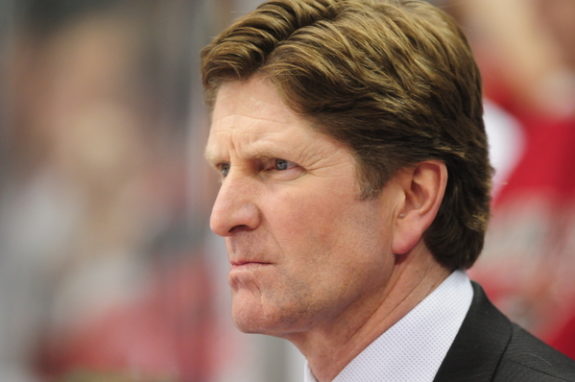
Not long after their incredible Stanley Cup run, the Mighty Ducks were very active in the 2003 Draft. Murray used his 19th overall pick to nab big-bodied centerman Ryan Getzlaf, and traded two second round picks to get Corey Perry. These moves proved fruitful as Getzlaf and Perry formed a formidable duo that grew into cornerstones of the franchise, and were key contributors to the team that brought the Ducks the Stanley Cup.
Things started going south for Murray after the draft as he was unable to re-sign star forward Paul Kariya. He tried to fill the gap left by Kariya’s departure by signing All-Star forward Sergei Fedorov and Vinny Prospal, who led the team in points during the 2003-04 season. The Mighty Ducks, however, could not recreate the 2002-03 magic that brought them to the Stanley Cup Final. They missed the playoffs that season.
Following the 2003-04 season, Murray decided to leave the Mighty Ducks’ front office and pursue a head coach opportunity with the Senators. New GM Brian Burke offered Babcock, whose contract had expired, a one-year deal to return to the team but Babcock declined. He felt as if Anaheim was no longer a good fit for him, and that he could find better offers elsewhere. He eventually signed on as the head coach of the Red Wings and found a great deal of success there.
Randy Carlyle (2005-11)
Following the 2003-04 season, the NHL owners and players got into a labor dispute which led to the cancellation of the 2004-05 season. During the 2004-05 lockout, the Walt Disney Co. sold the Mighty Ducks to Henry and Susan Samuelli who made it a priority to revamp the front office in the wake of Murray’s departure.
Off heavy recommendation from NHL Commissioner Gary Bettman, the Samuelli’s brought on former Canucks vice president and GM Brian Burke. In looking for a coach, Burke wanted someone who shared his passion and intensity for the game. He found it in Randy Carlyle.
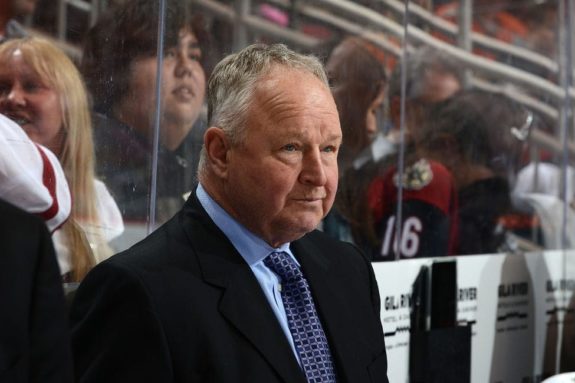
“I hate to lose. I know Randy hates to lose as much as I do,” Burke said of Carlyle. Previously, Carlyle had been a successful coach in the IHL with the Manitoba Moose. He led them to the playoffs in five of the six seasons he was the head coach, and he continued that success with the Ducks, bringing them to the Western Conference Final in his first season.
The Ducks were a fine team, having acquired elite defenseman Scott Niedermayer out of free agency in 2005. Burke also brought back Selanne, who had a resurgent season and led the team with 90 points. The Ducks felt they were one piece away from being a legitimate Stanley Cup contender and they found that piece in bruising defenseman Chris Pronger.
With all their ducks in a row, the Carlyle-coached 2006-07 Ducks became a dominant team, earning 110 points in the regular season, good enough for first in the Pacific Division. They were dominant in the playoffs as well, and earned a spot in the Stanley Cup Final against the Senators, coached by Murray. The Ducks won that series in five games, earning them the first and only Stanley Cup in franchise history and the first Stanley Cup won by a California team.

After their Stanley Cup season, Carlyle continued to coach the Ducks to moderate success, reaching the playoffs in five of the six full seasons he coached the team. It wasn’t until the 2011-12 season where things got really bad for Carlyle. To Begin that season he coached the team to 7-13-4 in their first 24 games, including a seven-game losing streak. After such a bad start, GM Bob Murray replaced Carlyle with Bruce Boudreau, citing the need for a “new voice” in the locker room.
Bruce Boudreau (2011-16)
Boudreau hit the ground running in his NHL coaching career. After a very successful stint with the Hershey Bears in the AHL, he was brought in to coach the Capitals after a disappointing start to the 2007-08 season. He turned that team around and brought them to the top of their division and a brief playoff appearance. He coached the Capitals to the top of their division in each season he was the head coach and became the fastest coach to reach 200 wins in NHL history.
In the 2011-12 season, the Capitals got off to a very good start, posting a 7-0 record to begin the season. After that, he lost the ears of the players. Washington went on to a record of 12-9-1 before firing Boudreau became inevitable. Feeling that his own team needed a new voice in the locker room, Murray wasted no time in picking up Boudreau. Two days after he was fired by Washington, the Ducks had their new head coach.
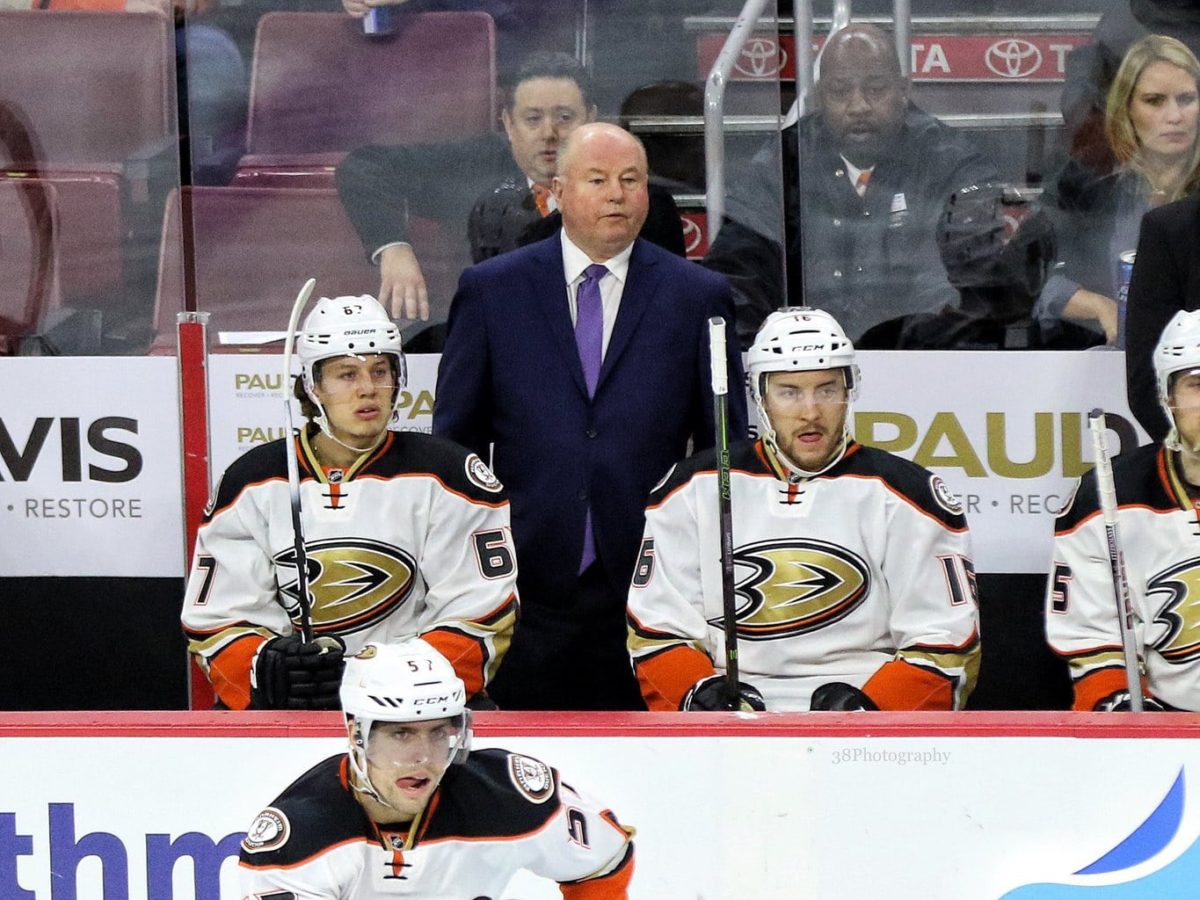
Boudreau’s regular-season record with the Ducks was wildly successful, leading them to a division title in every full season he coached the team. His struggles came in the playoffs as, four years in a row, the Ducks went up in a series 3-2 only to lose the series in Game 7, including a Western Conference Final matchup against the Blackhawks.
After one too many seasons of diminishing returns, Murray fired Boudreau and brought in someone who could better get his team through the playoffs. Boudreau left the Ducks with an impressive regular-season record of 208-104-40 and had a 24-19 record in the playoffs.
Randy Carlyle’s Return (2016-19)
Murray knew his team’s playoff window was closing. His core players Getzlaf, Perry, and Ryan Kesler were aging quickly and wouldn’t be able to carry the team in a few years. Murray felt the need to bring in a coach that would help them win now. For that reason he brought back Carlyle, the most successful coach in Ducks history.
Carlyle’s return paid immediate dividends as he led his team to the Western Conference Final in the 2017 Playoffs. The Ducks hoped to build on that success in the next season, however, they got swept in the first round by the Sharks.
The 2018-19 season was mediocre for the Ducks, including a franchise-record 12-game losing streak. Murray had Carlyle’s back though, insisting that their problems are deeper than just a coaching change.
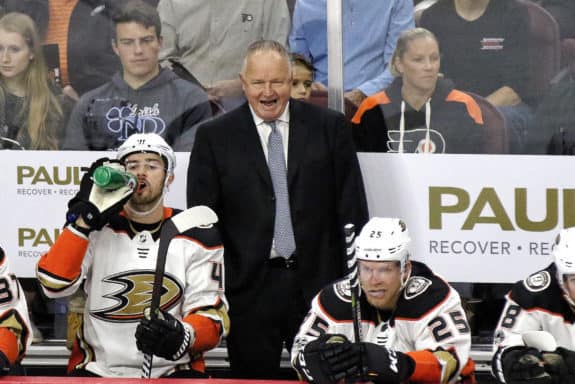
Whether or not Murray truly believed that, it came to a point where enough was enough. Carlyle was fired in February 2019 and Murray decided that it was better that he himself coached the team for the remainder of the season rather than appoint an interim head coach.
Dallas Eakins (2019-Present)
The hiring of Eakins signaled a new era for the Ducks. The bad taste of Carlyle’s firing the previous season still lingered in fans’ mouths after Murray decided to take matters into his own hands and coach the team for the remainder of the season following Carlyle’s departure in February 2019.
Eakins’ hiring was viewed as an appropriate reward for someone whose previous head coaching experience at the NHL level wasn’t exactly stellar. Eakins was in charge of a pair of brutal Oilers teams during his partial two seasons as head coach––he was fired during his second season after the team lost 15 out of 16 games. He had lost the locker room and was heavily criticized throughout his tenure for not getting the most out of players like Ryan Nugent-Hopkins, Taylor Hall and Nail Yakupov.
After being let go by the Oilers, Eakins joined the San Diego Gulls, the Ducks’ AHL affiliate, as their first AHL affiliate head coach in 2015. While Eakins’ head coaching record at the NHL level hadn’t lived up to expectations to that point, he was a respectable head coach at the AHL level.
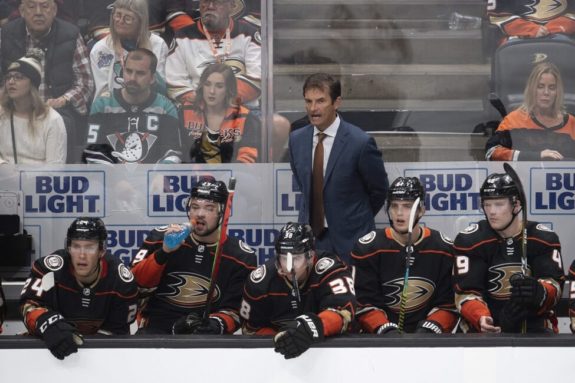
During his four years as head coach of the Toronto Marlies––the Maple Leafs’ AHL affiliate––the team reached the conference finals twice and made it to the Calder Cup Final in 2012, where they lost to the Norfolk Admirals. Those same Admirals were the Ducks’ AHL affiliate at the time and were the team that ended up moving to San Diego in 2015 to become the Gulls. Talk about a twist of fate.
The Gulls performed exceptionally well under Eakins, making it to the Western Conference Semifinal two consecutive seasons. Following a season without postseason aspirations in 2018, the Gulls returned to the playoffs the following season and made it all the way to the Western Conference Final, where they would lose to the Chicago Wolves.
The Gulls’ performances with Eakins at the helm––along with his ability to connect with the younger players on the team––convinced Murray and the rest of the Ducks ownership that the former Oilers head coach deserved a shot at redemption and was the right man to be deemed the 10th head coach in Ducks history.
The Ducks are no longer the Stanley Cup contenders they once were during the 2010’s and should probably be rebuilding. However, it’s difficult to undergo such an operation when the man in net is seemingly the best player on the team and is locked down to a team-friendly contract for the next several years. As much as it seems impossible right now, Getzlaf also wants to win another championship, and he wants to do it with the Ducks.
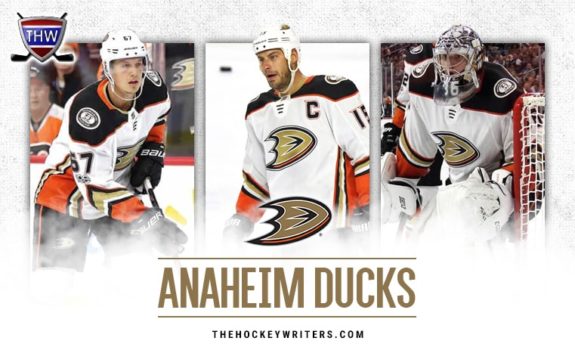
The shortened season left the Ducks at 29-33-9, which was good (or bad) enough to net them the sixth overall pick in the 2020 NHL Draft. They selected Erie Otters defenseman Jamie Drysdale. Along with Drysdale, the Ducks possess young talents in Trevor Zegras, Maxime Comtois, Troy Terry and Sam Steel.
Eakins needs to get the most out of these young players if the Ducks hope to return to the playoffs. Entering his second season with the Ducks, Eakins should have a firmer understanding of how his team plays and what he needs to do to get them going. So far, his second go-around as an NHL head coach has been fairly smooth.
